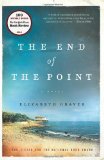Summary | Excerpt | Reading Guide | Reviews | Beyond the Book | Readalikes | Genres & Themes | Author Bio

Excerpt
The End of the Point
On the stillest, emptiest days, you can almost but not quite imagine the place when it was lived on by its earliest people, the trapping and fishing, tying and smashing, the waves the same, the rocky beaches too, but no army base, no bisecting road or fighter planes up from Otis Air Force Base, Code Red. No houses unheated, built for summer, or mansions with heat, Wi-Fi and central air. No blinking eye on a metal gate (no gate). Neither headstones nor written alphabet. Later: Here Lies John Cornell. Here Lies Tabitha Brown. Here, a stone fishing weir at the foot of the creek. Here, a summer wetu; inside, a woman labors upright, giving birth. Did they dunk the baby in the creek, wrap him in a new red blanket, dress him, as he grew, in a pair of woolen breeches? One year, they had to find another place to grow him into a man.
A deed appointed to be recorded. New Plymouth. November the 29th 1652.
Know all men by these Presents, that I, Wesamequin, and Wamsutta, my son, have sold unto Mr. Wm. Bradford, Capt. John Standish, Thomas Southworth, John Winslow, John Cook and their associates . . . all the tract or tracts of Land lying three miles eastward from a river called Cushnett, to a certain Harbour called Acoaksett, to a flat Rock on the Westerward side of said Harbour . . . with all the rivers, creeks, meadows, necks and islands that lye in or before the same, and from the sea upward to go so high that the English may not be annoyed by the hunting of the Indians in any sort of their cattle. And in consideration hereof . . . We the above-mentioned are to pay to the said Wasamequin and Wamsutta as followeth: Thirty yards of cloth, eight moose skins, fifteen axes, fifteen hoes, fifteen pair of breeches, eight blankets, two kettles, one cloak, £2 in wampum, eight pair of stockings, eight pair of shoes, one iron pot and ten shilling in another Commodity.
One iron pot to fill with corn mush, or with a rabbit trapped, skinned, boiled down to bone. John Cooke, signatory, will be the first to farm the rocky, wind-scoured fields of Ashaunt, the Point barely two miles long, half a mile wide, hardly an appendage, more a stub, a neck without a head. A peninsula, as in paene (almost), as in insula (island). Ashaunt, "lobster crawling backward" in Wampanoag. The shoes have brass buckles; each shoe fits either foot. The blankets are woolen, red. An acre for a shoe, two acres for a shilling. Fifteen axes, fifteen hoes. One by one, they bend, they sign. In the presence of John Winslow Jonathan Shaw John Cook Samuel Eddy Wamsutta. + + his mark.
To crane this far back bends hard the mind, fills it with things crude and small, with other things whose necks have been wrung dead. Also with nostalgia (and its kissing cousin, anger). The place breeds it—for this old house, this old couch, this old tribe, one-speed bicycles, driftwood naturally distressed. At one time, a saltworks stood at the foot of the Point. At another, a bootlegging outfit. Table salt hardens here. Books mildew. Diaries flip open. Private Property: Please Turn Around. Sometimes arrowheads or bits of pottery and china show up in the churned soil of the few fields still farmed. How fine they would look set in the antique printing box above the bed made up with white Wamsutta sheets, to the left of the nightstand where the clock has stopped again.
On the Point you can still find bones—fox skulls, rabbit femurs, porpoise vertebrae and, on the shore in the crevice between two hard-lodged stones, a milk tooth lost by a child no longer a child. From May through October, swimmers—mostly women—swim, and men dunk, and children jump from the top railing of the dock. One year (and then the next and next) a bloom of jellyfish will come up in August from the Gulf of Mexico on a wave of warmth. To swim among them is to swim inside a living body, a dividing cell. A deed appointed to be recorded. From a certain Harbour to a flat Rock.
From The End of the Point by Elizabeth Graver Copyright © 2013 by Elizabeth Graver. Reprinted courtesy of Harper, an imprint of HarperCollins Publishers.
Discovery consists of seeing what everybody has seen and thinking what nobody has thought.
Click Here to find out who said this, as well as discovering other famous literary quotes!
Your guide toexceptional books
BookBrowse seeks out and recommends the best in contemporary fiction and nonfiction—books that not only engage and entertain but also deepen our understanding of ourselves and the world around us.